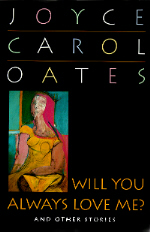Tags
American literature, Joyce Carol Oates, literature, modern literary fiction, review, short story review
 I’ve not yet made up my mind on Joyce Carol Oates. Her novel Them stunned me with its power but A Garden of Earthly Delights from the same quartet felt ponderous, an American Gothic collapsing under the weight of its hammered-home futility. Cautious of her novels, I have gravitated to her short fiction for a demonstration of her talents and this choice has paid off: these stories reinstate the interest in Oates that A Garden drove underground.
I’ve not yet made up my mind on Joyce Carol Oates. Her novel Them stunned me with its power but A Garden of Earthly Delights from the same quartet felt ponderous, an American Gothic collapsing under the weight of its hammered-home futility. Cautious of her novels, I have gravitated to her short fiction for a demonstration of her talents and this choice has paid off: these stories reinstate the interest in Oates that A Garden drove underground.
Despite her extreme productivity, quality control remains surprisingly high – the stories in 1996’s Will You Always Love Me? are all perfectly respectable, with only a few hazy passages to betray her galloping pace. There are 22 in this particular collection, all more or less interesting. Unfortunately all of the less interesting ones were placed at the start. The book is divided into three unnamed installments which I would label Domestic Dramas, Random Interactions and Extreme States. Each is more diverse than the last. I would have preferred them shuffled up, no algorithm, always unsure what was coming next. As is, the collection sagged until ‘American, Abroad’ was concluding and then it was off to the races at last…
The highlight of the first batch would be ‘You Petted Me and I Followed You Home,’ where a couple’s strained interactions (emotions running high on alcohol) are punctured by reappearances from a stray dog that they were momentarily kind to. Perfectly balanced with no extraneous material.
The other six aren’t so convincing, though Oates has an eye for detail that must be reckoned with. ‘Act of Solitude’ is at its best dealing with Chester’s road accident, his internal monologue, rehearsing his defense:
I warned him, I made myself perfectly clear.
I won’t be extorted in my own car, in daylight.
I’m not a coward, to be extorted, in my own car, in daylight.
I’m not a racist. I had no awareness of the color of his skin.
I didn’t mean to hurt him, if I hurt him.
My windshield. My car.
And on like that. It makes for an arresting opener to the collection but there is also irrelevant focus made to his relationships with his wife and father – never mind that no one who reads it will remember it for that.
‘The Revenge of the Foot, 1970’ is better, a nasty little tale of a woman who steals a human foot from medical students and smuggles it into the home of her married lover. ‘Politics’ and ‘Good to Know You’ are vignettes on material we’ve all heard before with nothing new brought to the table. The title story of a woman’s obsession with her murdered sister is oddly enough rather unmemorable. It sits back to back with ‘The Missing Person’ and they share too many similarities. Both have a decent man fall for a mysterious, troubled woman whose riddle is later revealed to him. While Ursula and Andrea’s stories are quite different to each other the framing devices are near identical. They blur and so both are robbed of power.
In contrast, the second set is entirely unique one to another. There’s little by way of theme. They appear to be scraps that wouldn’t fit in either of the other categories, only similar by the random chance that causes essential strangers to interact. Two center on middle-aged women out of their depths among the dramas of the younger generation: in ‘The Goose-Girl’ a boy’s mother interferes against her better judgement in an assignation he’s been offered while in ‘The Girl Who Was To Die’ a widow watches bewildered as a young nurse’s boyfriend turns dangerous and her stepdaughter plays peacemaker with terrible results. In both, the main players’ motives are obscured by the befuddled viewpoints of the older women and it is that uncertainty which lingers in the mind.
‘The Track’ has a couple visit the racehorse they bought, fish out of water caught between admiration and fear of the powerful animals around them. ‘Life After High School’ has Sunny Burhman’s life derailed by a rejected admirer’s suicide. ‘American, Abroad,’ after a slow start, introduces the lonely art historian of the title to a diplomat’s daughter: so striking a woman, so spectacularly forceful a presence, a ball of flame might have swept into the decorous gathering, contrasting painfully with the older men and women, the majority of them middle-aged, so carefully, even elegantly dressed and groomed. She would appear to be the dream student – intense, enthusiastic, full of hungry questions and admiration – but is the first impression correct?
Anyone even passingly familiar with Oates can answer that. All of these stories are good, however, and two more inject some tenderness into her bleak world: ‘June Birthing’ and ‘The Handclasp,’ the latter a melancholic but strangely beautiful tale of an unstable woman, her devoted husband and a deceased student’s manuscript, the strain in her mind growing unbearable… It was happiness that was not happiness, as an eye-piercing beam of light is not light but blindness.
The final section of extreme states begins with a pair of sharp satires narrated in the plural “Rose for Emily” style. ‘Is Laughter Contagious?’ is a frankly horrific suburban satire while ‘The Undesirable Table’ portrays the internal squirmings of pretentious ivory tower foodies seated in the wrong part of their favorite restaurant. Humour isn’t something I associate with Oates but this one has a certain piquancy. How popular is Le Coq d’Or! – a region, an atmosphere, an exquisite state of the soul rather than merely a restaurant. In such surroundings, amid the glitter of flashing cutlery, expensive glassware, and crystal chandeliers, animal gluttony is so tamed as to appear a kind of asceticism.
‘The Brothers,’ ‘The Lost Child’ and ‘Christmas Night 1962′ deal with childhood scarring. One girl is caught in the crossfire of her parents’ fight and is rushed to the hospital; the other gains her first sense of male predation through a pornographic photo. ‘The Brothers’ has a grown man recall an ancient humiliation through recurring dreams but is the least effective and distressing of the trio.
Finally the three religious passions – ‘The Vision,’ ‘The Passion of Rydcie Mather’ and ‘Mark of Satan’ – none of whose plots I feel like disclosing, each being highly unpredictable and vaguely terrifying. They offer an emotional crescendo to the book and disclose the common shadow of death that hangs over so many of the stories herein: Floyd seeing now unmistakably how the Blessed Virgin’s head was a death’s head inside the tight white wimple, the eye sockets perfect empty Os and the toothed jaws grinning Do not fear, Floyd: I have always been with you. This explains the unattractive cover for one (Willem de Kooning’s Queen of Hearts for those art buffs out there) and it makes the title seem oddly superfluous to the collection. Unless I’m missing something.
In short, this has resuscitated Joyce Carol Oates in my eyes, though on the basis of my reactions I am more drawn to her macabre and fantastic side rather than her kitchen-sink side (so I’m unlikely to be reading We Were the Mulvaneys anytime soon). I’ve heard her called the dark lady of American letters and I’m gaining an inkling of why she deserves the title. Her works change hands in used bookstores frequently so if you sight this one out shopping go for it. Slow start but an electrifying payoff.


“Galloping pace” is right–a mind-boggling output for a woman who’s also a full time tenured professor. I’ve read a couple of her efforts and I do think sometimes another round of edits and tightening would raise her a notch or two as an author. That said, she is miles beyond most of the scribes plying their trade these days, torturing syntax and re-using the same old stale themes. She’s literate, smart and pretty damn savage when the mood strikes her.
Have you read her book on boxing? Definitely worth a look:
http://www.thesweetscience.com/columnists/joe-rein/1601-joyce-carol-oates-on-boxing
My favorite quote: Oates says: “Boxing is for men, and is about men, and is men. A celebration of the lost art of masculinity all the more trenchant for being lost.”
Bless ya, Joyce…
Threw On Boxing onto my Amazon wishlist. All the quotes are fantastic. I don’t know much about the sport so I expect it will be greatly illuminating.
“Savage” is exactly the word for Oates. It’s definitely one of the things I admire her for. Also her ability to blend a gothic atmosphere into stories that are ‘technically’ realistic.
I figure the size of her bibliography means she’ll be viewed down the road as a 20th Century Balzac.
Thank you for commenting.